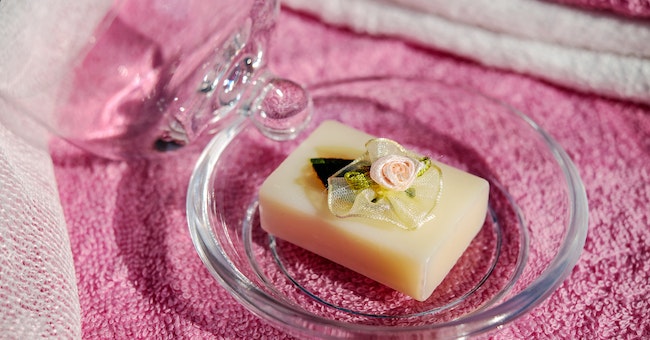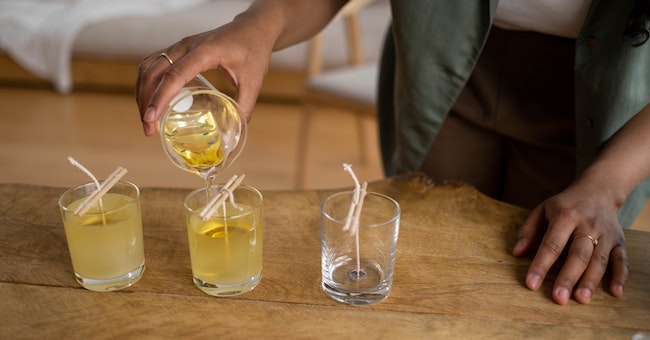Best Soap Making Classes Online

Introduction
Soap making has become a popular hobby in recent years. People are increasingly interested in making their own soaps, not only for personal use but also to sell. Homemade soaps are not only more natural and gentle on the skin, but they are also more affordable than commercial soaps. Many people are now turning their passion for soap making into a profitable business by selling their creations online or at local markets.
To cater to the growing demand for soap making knowledge, online classes have emerged as a convenient and accessible option. These classes provide an opportunity to learn the art of soap making from the comfort of one's home. They offer a comprehensive understanding of the basics, as well as the chance to explore new techniques and recipes. Online soap making classes are particularly beneficial for individuals with busy schedules who are unable to attend in-person classes.
Soap Making Classes Online: A Gateway to Creativity
Exploring the World of Soap Making for Beginners
To create exceptional soaps, it is crucial to familiarize yourself with the essential ingredients and equipment required for soap making. From lye and oils to fragrances and molds, each component plays a vital role in the soap-making process.
Ingredients:
Fats or Oils: Soap can be made from a variety of fats or oils, such as olive oil, coconut oil, palm oil, or shea butter. Each fat or oil brings different properties to the soap, such as hardness, lather, and moisturizing abilities.
Alkali Substance: Sodium hydroxide (lye) is the most commonly used alkali substance in soap making. It is essential for the saponification process, which is the chemical reaction that turns fats and oils into soap. Lye is highly caustic and should be handled with care.
Water: Water is used to dissolve the lye and create a lye solution, which is then mixed with the fats or oils to initiate saponification.
Equipment:
Safety Gear: Soap making involves working with lye, so it is crucial to wear protective gear such as gloves, goggles, and a long-sleeved shirt to prevent any contact with the skin.
Heat Source: A heat source, such as a stove or a hot plate, is needed to melt the fats or oils and heat the lye solution.
Mixing Containers: Heat-resistant containers, such as stainless steel or heat-resistant plastic, are used to mix the lye solution and the fats or oils.
Stick Blender or Whisk: A stick blender or whisk is used to mix the lye solution and the fats or oils together, ensuring they are thoroughly combined.
Soap Molds: Soap molds are used to shape the soap into desired shapes and sizes. They can be made of silicone, plastic, or even cardboard.
Procedures:
Safety Precautions: Before starting the soap making process, ensure you are wearing appropriate safety gear and working in a well-ventilated area.
Measuring: Weigh the fats or oils and the lye accurately using a digital scale. The measurements are crucial for the soap to turn out correctly.
Mixing: Slowly add the lye to the water, stirring continuously until it is fully dissolved. Allow the lye solution to cool.
Melting: Melt the fats or oils in a heat-resistant container using a heat source. Once melted, remove from heat and let it cool slightly.
Combining: Slowly pour the lye solution into the melted fats or oils, stirring continuously. Use a stick blender or whisk to mix until the mixture reaches trace, which is a thick, pudding-like consistency.
Adding Fragrance and Color: At this stage, you can add fragrance oils, essential oils, or colorants to the soap mixture, stirring well to distribute them evenly.
Pouring: Pour the soap mixture into the soap molds, tapping them gently on a flat surface to remove any air bubbles.
Curing: Allow the soap to cure for several weeks, during which time it will harden and become milder and gentler on the skin.
Free Online Soap Making Classes
Soap making classes online are a great way to unleash your creativity. They offer a wide range of classes that cater to different levels of experience and interests. Whether you are a beginner or an experienced soap maker, there is a class tailored for your needs. Online classes provide step-by-step instructions and guidance, making it easy for you to create your own unique soap recipes. Some key advantages of free courses include:
Accessibility: Free online soap making classes eliminate the barrier of cost, making them accessible to a wide range of individuals. Beginners can embark on their soap making journey without the need to invest in expensive courses or materials initially.
Introductory Knowledge: Free courses often focus on providing beginners with essential foundational knowledge. They cover topics such as soap making techniques, ingredient selection, safety precautions, and basic recipes. By offering this introductory knowledge, free classes enable beginners to gain a solid understanding of soap making principles.
Risk-Free Exploration: For those unsure about committing to soap making as a long-term pursuit, free courses allow for risk-free exploration. Participants can experiment with soap making techniques, discover their creativity, and determine if they wish to continue pursuing this craft further.
Building Confidence: Free online classes provide beginners with an opportunity to build their confidence in soap making. By following step-by-step instructions and practicing basic techniques, participants gain a sense of accomplishment and develop the necessary skills to progress in their soap making journey.
Platforms Offering Free Soap Making Classes:
Various online platforms offer free soap making classes, catering to beginners who are eager to learn the craft at no cost. These platforms may include:
Educational Websites: Many educational websites and online learning platforms offer free soap making courses as part of their creative arts or DIY sections. These platforms provide instructional videos, written guides, and interactive forums where participants can engage with instructors and fellow learners.
Social Media Communities: Soap making enthusiasts often create social media communities dedicated to sharing knowledge and tutorials. These communities may host live video sessions, share downloadable resources, and provide guidance to beginners interested in learning soap making.
Soap Making Blogs and Websites: Several soap making enthusiasts and experts maintain blogs or websites where they share their knowledge and experiences. These platforms often offer free tutorials, recipes, and tips for beginners. They can be a valuable resource for acquiring foundational knowledge in soap making.
YouTube Channels: YouTube is a rich source of free soap making tutorials and demonstrations. Many soap makers and educators share their expertise through detailed videos, providing step-by-step instructions and showcasing various techniques. Beginners can access these channels to learn and gain inspiration for their soap making projects.
Government-Led Soap Making Training Programs:
Government-led soap making training programs offer distinct advantages to individuals interested in pursuing soap making as a profession or small business. These initiatives aim to support entrepreneurship, empower individuals with skills, and contribute to economic development. Some advantages of government-sponsored soap making programs include:
Comprehensive Training: Government initiatives often provide comprehensive training programs that cover a wide range of soap making aspects. These programs combine theoretical knowledge with practical hands-on experience, ensuring participants acquire the necessary skills to succeed in the industry.
Mentorship and Guidance: Government-sponsored initiatives may offer mentorship opportunities, allowing participants to learn from experienced soap makers. Mentors can provide valuable insights, personalized feedback, and advice on various aspects of soap making, including product development, marketing strategies, and business management.
Networking and Market Access: Government programs often facilitate networking opportunities and connections within the soap making industry. They may organize trade fairs, exhibitions, or platforms where participants can showcase and sell their products. Such initiatives help participants establish valuable contacts, gain exposure, and access potential customers or retailers.
Financial Support: In some cases, government-led soap making programs may offer financial support in the form of grants, loans, or subsidies. These financial resources can assist participants in procuring equipment, purchasing raw materials, or covering initial business setup costs.
If you are seeking government-sponsored soap making training programs, you can find opportunities through local government websites, entrepreneurial development agencies, trade associations, chambers of commerce, and business incubators. These channels offer structured training, mentorship, and potential financial assistance, providing a solid foundation for establishing and growing soap making ventures.
The Best Online Courses for Aspiring Soap Makers
Seeking to enhance their skills and knowledge? The realm of online learning offers a plethora of opportunities. With numerous online courses tailored specifically for soap making enthusiasts, you can delve into the art and science of soap making from the comfort of your own home. Let's explore some of the best online courses available, designed to equip aspiring soap makers with the expertise needed to create beautiful, handmade soaps.
Platform: Udemy
Teacher: Ansa Smit
Length: 30 video lessons totaling 6 hours and 24 minutes
Comprehensive course covering all aspects of soap making, from safety equipment to packaging and labeling laws
Instructor provides guidance on equipment and ingredient selection
Price: $69.99
Platform: Udemy
Teacher: Shona O'Connor
Length: 54 video lessons totaling 2 hours and 39 minutes
Focuses on the melt and pour soap making technique
Suitable for beginners and those who prefer a simple method without the need for equipment or dangerous chemicals
Platform: Soap School
Teachers: Shawn and Sarah Janes
Length: Over 25 video lessons
Covers the cold process soap making method
Provides in-depth knowledge on ingredients, saponification, formulation, coloring, fragrance, and more
Offers ongoing tutor support
Price: £125 (approximately $150)
DIY Fishbowl Soap - Inspired By Threadbanger (Royalty Soaps)
Platform: Youtube Channel
Teachers: Katie Carson
Length: Mostly under 20 minutes
Level: Intermediate to advanced
Entertaining contents and suitable for eveyone
Gathering creative ideas
Price: Free
Platform: Youtube Channel
Teachers: Soapish
Length: Mostly under 20 minutes
Level: Intermediate
Complimentary and easy-to-navigate course
Concentrating on crafting striped soaps using the cold process soap making method
Price: Free
Soap Making for Profit: Transforming Skills into a Business
In the realm of soap making, you can have the opportunity to convert your skills into a thriving business venture. This section explores the key aspects of starting a soap making business and capitalizing on the demand for handmade soap products.
The Demand for Handmade Soap Products
The demand for handmade soap products has experienced a significant rise in recent years. This can be attributed to several factors that have influenced consumer preferences and shopping behaviors. One of the key drivers behind the increasing demand is the growing awareness and emphasis on natural and organic products. Handmade soaps, often crafted with natural ingredients and free from harsh chemicals, appeal to consumers seeking alternatives to mass-produced commercial soaps.
Handmade soaps are favored for their unique qualities and benefits. They are often formulated with nourishing oils, botanical extracts, and essential oils, providing moisturizing and therapeutic properties. These products are known for their gentle nature, suitable for various skin types, including sensitive and problem-prone skin. Unlike mass-produced soaps, handmade soaps are crafted in small batches, allowing artisans to pay attention to detail and create personalized and artisanal products.
Moreover, the demand for handmade soap products is driven by consumers' desire for individuality and personalization. Handmade soaps offer a wide range of scents, colors, and designs, allowing customers to find products that resonate with their preferences and tastes. The uniqueness and craftsmanship associated with handmade soaps add to their appeal, making them popular choices for personal use and gift-giving.
The rise of online platforms and e-commerce has also contributed to the growth of the handmade soap market. Online marketplaces, independent websites, and social media platforms provide soap makers with opportunities to showcase and sell their products to a broader audience. This increased accessibility and convenience have further fueled the demand for handmade soaps, as customers can easily browse and purchase from the comfort of their homes.
Strategies for Starting a Soap Making Business
First, to stand out in a competitive market, it is essential to establish a distinct brand identity and carve out a niche market for your soap products. This involves defining your brand's values, mission, and aesthetic appeal. Identifying a specific target market or specializing in a particular type of soap, such as organic or luxury soaps, can help differentiate your business and attract loyal customers.
With the advent of e-commerce, selling handmade soaps online has become more accessible than ever. Effective online marketing strategies, such as creating a visually appealing website, utilizing social media platforms, and leveraging search engine optimization (SEO) techniques, can help reach a wider customer base. Building an online presence and engaging with customers through captivating product descriptions, attractive visuals, and customer testimonials can boost sales and foster brand loyalty.
Additionally, connecting with other soap makers through online networks and communities provides valuable opportunities for collaboration, learning, and sharing experiences. Engaging with like-minded individuals can help expand your knowledge, gain insights into industry trends, and access resources and advice that can contribute to the growth of your soap making business.
Last but not least, participating in forums and online communities dedicated to soap making can further enhance your expertise and keep you updated on the latest techniques, ingredients, and market trends. These platforms provide spaces for asking questions, seeking advice, and engaging in discussions with experienced soap makers. By actively participating and contributing, you can build a strong network, gain valuable insights, and continuously improve your soap making skills.
Conclusion
The art of soap making offers a creative and fulfilling journey for enthusiasts and aspiring entrepreneurs alike. Through this comprehensive guide, we have explored the fundamental aspects of soap making, from understanding the essential ingredients and equipment to mastering the step-by-step procedures. We have also delved into the various avenues for learning, including free online courses, government-led training programs, and the benefits of networking within soap making communities.
With the right knowledge, skills, and resources, aspiring soap makers can transform their passion for soap making into a profitable business venture. By capitalizing on the public demand, creating a distinct brand identity, utilizing effective marketing strategies, and leveraging online resources and communities, you can establish yourself in the market and cater to the evolving needs of discerning customers. The soap making journey not only offers opportunities for self-expression and creativity but also provides a pathway to entrepreneurship and financial success.
As you embark on your own soap making endeavors, remember to prioritize safety, continue learning and experimenting, and embrace the joy of crafting unique and luxurious soaps. Whether it's for personal enjoyment or building a thriving business, the art of soap making has the potential to bring fulfillment, satisfaction, and endless possibilities. So gather your ingredients, equip yourself with knowledge, and let your creativity flow as you embark on this exciting and rewarding adventure in soap making.





